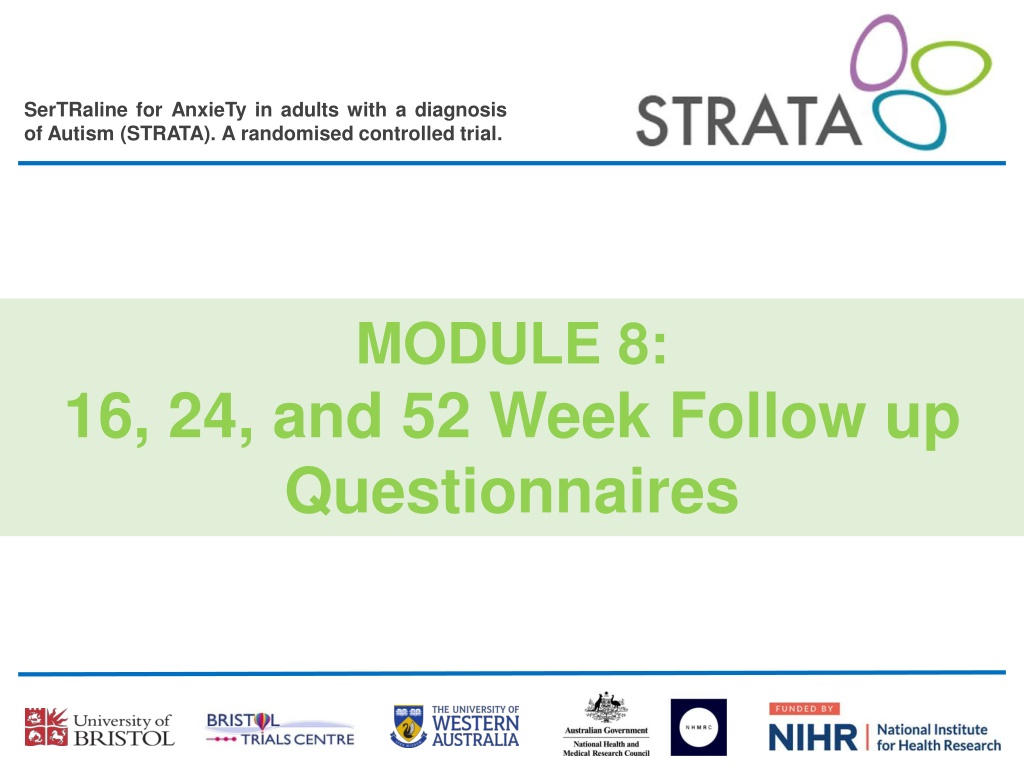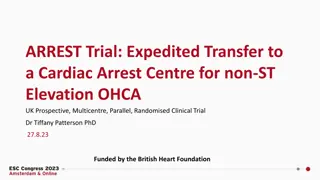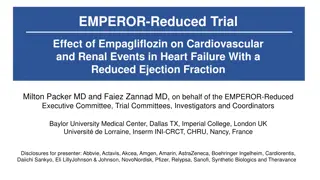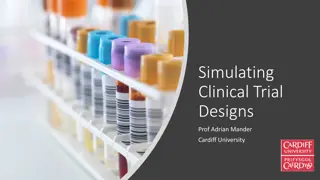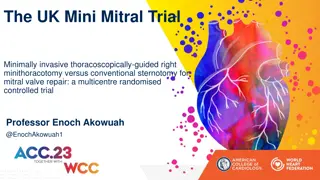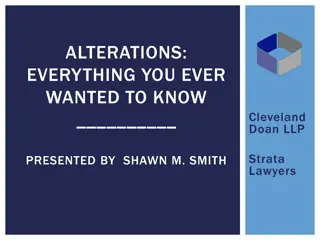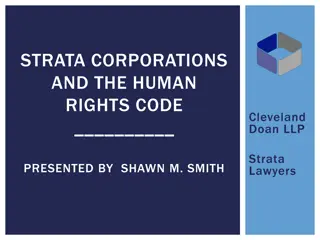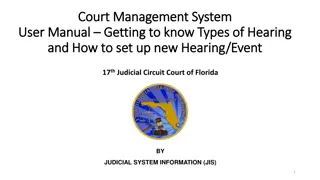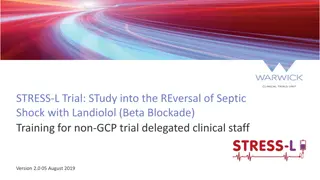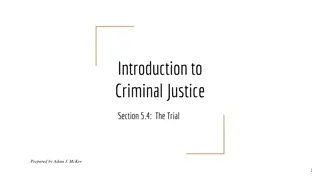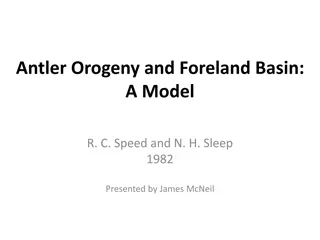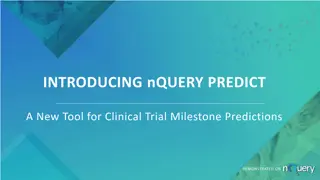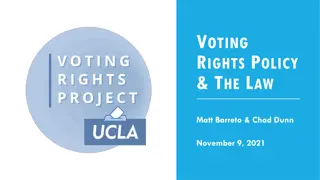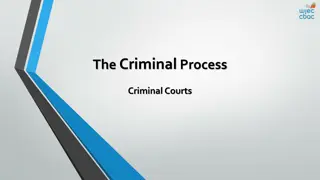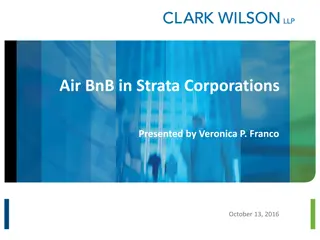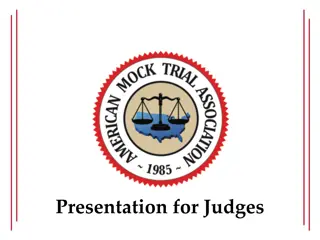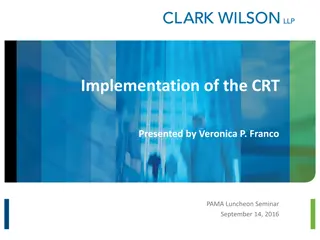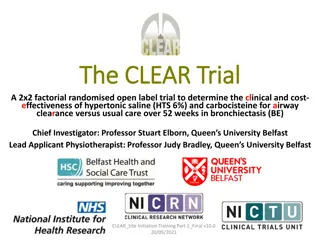Understanding Follow-up Procedures in the STRATA Trial
This module provides detailed information on the follow-up process in the STRATA trial for adults with autism and anxiety. It covers the timeline for sending questionnaires at 16, 24, and 52 weeks post-randomization, methods of completion, responsibilities of local research staff, and incentives for participants. The module emphasizes timely communication with participants and procedures for handling non-responses to questionnaire invites.
Download Presentation

Please find below an Image/Link to download the presentation.
The content on the website is provided AS IS for your information and personal use only. It may not be sold, licensed, or shared on other websites without obtaining consent from the author. Download presentation by click this link. If you encounter any issues during the download, it is possible that the publisher has removed the file from their server.
E N D
Presentation Transcript
SerTRaline for AnxieTy in adults with a diagnosis of Autism (STRATA). A randomised controlled trial. MODULE 8: 16, 24, and 52 Week Follow up Questionnaires
Content Content This training module covers key information about STRATA Follow-Ups at 16-, 24-, and 52-weeks post-randomisation. It includes: Overview of STRATA Follow-Ups Study Database Overview These icons are used throughout this module: Relevant study documents available in the site file Relevant sections of the study database
Overview of STRATA Follow-ups: Documents STRATA 16-Week Questionnaire STRATA 24-Week Questionnaire STRATA 52-Week Questionnaire STRATA Questionnaire Reminder STRATA End of Trial Notice STRATA GP End of Trial Notice
Overview of STRATA Follow-ups Local research staff/teams are responsible for the conduct of all participant follow ups. Participants should be asked to complete STRATA Follow Up Questionnaires; When? at 16, 24, and 52 weeks post-randomisation How? online is the default (or alternative methods if requested by the participant and where feasible) e.g. by video call (using Sponsor/ NHS-approved video-conferencing tools), postal hard copy, face-to-face, or telephone. If the participant requires assistance to complete the questionnaires, you should aim to try and make reasonable adjustments to facilitate this. A carer/family member or friend can provide support, but they will be advised not to answer any questions on behalf of the participant. Once a completed Follow-Up Questionnaire (or at least key data e.g. GAD-7, PHQ-9, and EQ- 5D-5L) is received and logged in the STRATA Clinical Database, the Central Research Team (UK or Western Australia) will send the participant a 10 gift voucher (or $20 in Australia).
Overview of STRATA Follow-ups 16-, 24-, and 52-weeks: online questionnaire invites are automatically sent by the STRATA Clinical Database on the target date (i.e. relative to randomisation date), with two reminders at 3 day intervals. If there is no response after 1 week of the target date: contact the participant for a third time with a reminder email/letter/equivalent contact - Use the STRATA Questionnaire Reminder. If there is no response after the third contact attempt: no more contacts should be made to obtain the questionnaire. The next follow-up questionnaire will still be sent automatically on the target date. N.B. For participants who have requested to complete their questionnaires on paper: If the local research team does not receive a response within a reasonable time they should contact the participant, with a reminder letter/equivalent contact up to three times. If no response after the third attempt, follow-up questionnaires should continue to be sent on the target dates as planned.
Overview of STRATA Follow-ups ! IMPORTANT ! Participant contact at 16 and 24 weeks (post-randomisation) is essential for further supplies of medication, even if they do not wish to complete the questionnaire. Participants are informed in study documentation that if they wish to discontinue taking the medication, they should contact you (their local research team) so that support regarding down titration is given. Participant contact need not be the completed questionnaire, but confirmation (e.g. verbal/written) that they are still taking the medication and wish to continue, is essential. If no participant contact is received at 16 or 24 weeks: the local research team should call (email/text or equivalent) to check; could utilise a back-up best contact (e.g. carer/ other family member, where provided). If no contact can been made, the local research team will should discontinue the participant s medication (follow the instructions in Module 11: Change of Permissions / Withdrawal), to ensure that new medication is not supplied to the participant for safety purposes.
Overview of STRATA Follow-ups ! Nota Bene ! The primary outcome is the patient reported outcome measure GAD-7 anxiety score at 16-weeks post-randomisation. Therefore, it is especially important for participants to return a completed questionnaire at this timepoint.
Overview of STRATA Follow-ups (52 weeks) The 52-week post-randomisation follow up (questionnaire) is the final timepoint and marks the end of treatment. 1. The same reminder system noted previously also applies here, if needed. 2. In addition to the 52-week questionnaire, participants will be provided with information about tapering down and stopping the medication (STRATA End of Trial Notice). 3. Researchers should make a BRIEF EXIT CALL to explain to participants what will happen next; where feasible, combine with other discussions (e.g. when completing the questionnaire via video/telephone, and/or reminders contact). Alternatively, could make after receipt of completed questionnaire. Be sure to consider the participant s contact preferences, and arrange the call beforehand where applicable (e.g., as you would for Safety Check Appointments)
Overview of STRATA Follow-ups (52 weeks) The 52-week post-randomisation follow up (questionnaire) is the final timepoint and marks the end of treatment. 4. The participant s GP (or equivalent in Australia) will be informed when their patient has reached the end of study involvement, and also informed as to their treatment allocation via a STRATA GP End of Trial Notice Letter, sent by the study pharmacist (or delegate) at the central pharmacy, as they are unblinded study staff members. The local RA will send aSTRATA GP End of Trial Notice Letter to the central study pharmacist, who will enter the participant s treatment allocation on the letter and send it directly to the participant s GP. (N.B: (1) Ensure that a secure method is used to send the letter, such as NHS Mail; (2) Provide address/contact details of the patient s GP to the pharmacist).
Pharmacovigilance Pharmacovigilance Local research teams are responsible for recording/reporting appropriate adverse events (AEs) for their participants during the trial Staff must communicate all AEs to the local Principal Investigator, to record/report the event/s as per protocol . This includes those reported directly by participants and those detected from questionnaire responses. See Module 9: Pharmacovigilance, and Section 10 of the Study Protocol for more information about pharmacovigilance requirements for STRATA
Study Database Overview Admin Project A040 Participants Clinical Project C050 Participant Pathway
Admin Database Overview Admin Database Overview Instruments relevant to follow up at 16, 24, and 52 weeks are in subsequent columns to the right of study ID The participant follow up dashboard contains every data collection instrument relevant to follow-up at 16, 24, and 52 weeks Participant study ID numbers are in the first column Contact Details Participant contact details should be completed or updated throughout the study where required. Appointment Booking details of the appointment, and contact attempts made. Questionnaire For recording if the questionnaire has been completed and any queries resolved. Treatment Review For recording information relevant to the treatment of the participant. Carer Contact Details For recording the carer contact details received on paper carer study questionnaires. End of study Checklist for confirming certain end of study processes are complete.
Clinical Database Overview Clinical Database Overview Instruments relevant to questionnaires completed are in subsequent columns to the right of study ID The Participant Follow Up dashboard contains every instrument relevant to follow up at 16, 24, and 52 weeks Participant study ID numbers are in the first column Carer Quest The carer study questionnaire, at the relevant timepoint. Quest The participant follow up questionnaire, at the relevant timepoint
Clinical Database Overview Clinical Database Overview 1. You can check the questionnaire has been completed - A green dot with a white tick will be displayed. 2. If the questionnaire is not complete, click on the grey dot and either enter data from a paper questionnaire, or key in the data during the appointment (where applicable). Save the form as Complete, and a green dot with no tick will appear.
Clinical Database Overview Clinical Database Overview 3. Clicking on the relevant survey dot (e.g. Quest) for the questionnaire will take you into the questionnaire to complete and/or review the answers.
Questions? Questions? 1 Check the FAQs on the study website: www.bristol.ac.uk/strata 2 Email the Central Research Team (University of Bristol, UK): strata-rct@bristol.ac.uk
Confirmation of training Confirmation of training When you have completed this training module, please let the STRATA Central Trial Team (UK) know by completing an online form. See: https://forms.office.com/r/vraB5ttrnc Your form should be saved and retained in your Investigator Site File.
Acknowledgements Acknowledgements Sponsor: Chief Investigator: Co-investigators: UK: University of Bristol (UoB). Dr Dheeraj Rai, Consultant Senior Lecturer in Psychiatry. Dheeraj.Rai@bristol.ac.uk Professor David Kessler, Professor of Primary Care, University of Bristol Professor Nicola Wiles, Professor of Epidemiology, University of Bristol Dr Stephanie J MacNeill, Lecturer in Medical Statistics, University of Bristol Dr Nicola Mills, Senior Research Fellow in Health Services Research, University of Bristol Dr Joanna Thorn, Research Fellow in Health Economics, University of Bristol Dr Ailsa Russell, Reader and Clinical Psychologist, University of Bath Mr Jack Welch, Autistic advocate and Discover insight group member/contributor Professor Traolach Brugha, Professor of Psychiatry, University of Leicester Professor David Baldwin, Professor of Psychiatry, University of Southampton Professor Peter Langdon, Professor of Clinical and Forensic Psychology, University of Warwick Dr Regi Alexander, Consultant Psychiatrist, Hertfordshire Partnership University NHS Foundation Trust Dr Raja Mukherjee, Consultant Psychiatrist, Surrey and Borders Partnership NHS Foundation Trust Associate Professor Helen Leonard, NHMRC Senior Research Fellow and Assoc Prof, University of Western Australia Dr Emma Glasson, Senior Research Fellow/Study Coordinator, University of Western Australia Professor Sergio Starkstein, Professor of Psychiatry, University of Western Australia Australia: The University of Western Australia (UWA) Trial Manager(s): Mr Doug Webb and Dr Amanda Lewis, Bristol Medical School, University of Bristol, UK. strata-rct@bristol.ac.uk Senior Research Associate: Dr Jade Eloise Norris, Bristol Medical School, University of Bristol, UK Senior Research Officer: Ms Katherine Hatch, Freemantle Hospital, University of Western Australia Study Management: This study was designed and delivered in collaboration with the Bristol Randomised Trials Collaboration (BRTC), a UKCRC registered clinical trials unit (CTU) which, as part of the Bristol Trials Centre (BTC), is in receipt of National Institute for Health Research CTU support funding. Funding Acknowledgement and Disclaimer: This study is funded by the National Institute for Health Research (NIHR) HTA Programme (Ref: 127337). The views expressed are those of the author(s) and not necessarily those of the NIHR or the Department of Health and Social Care. The authors and University of Western Australia acknowledge funding from the National Health and Medical Research Council (Project Grant 1171206). The contents of the published material/website are solely the responsibility of the authors and do not reflect the views of NHMRC. REDCap: Study data are collected and managed using REDCap (Research Electronic Data Capture, Harris PA, et al. J Biomed Inform. 2009 Apr;42(2):377- 81) hosted at the University of Bristol.
